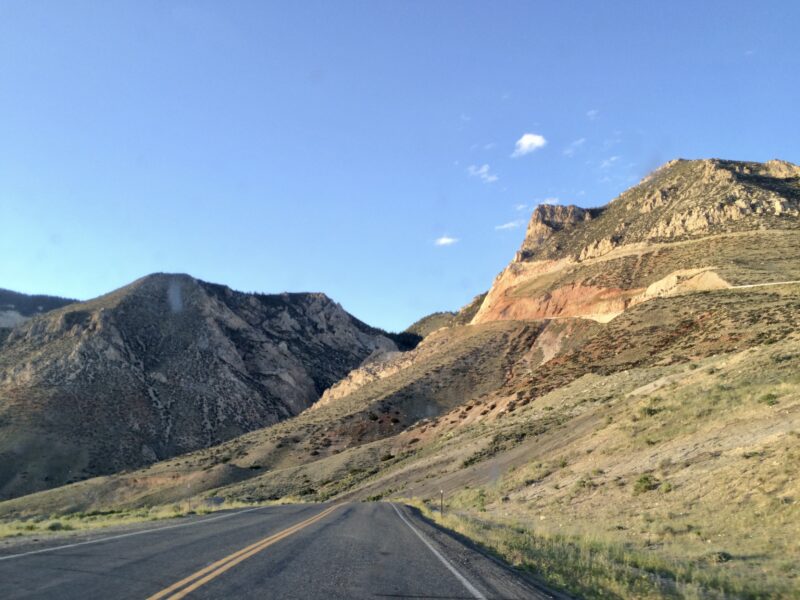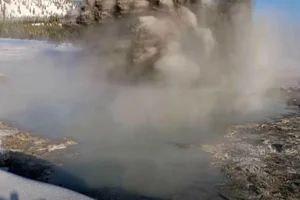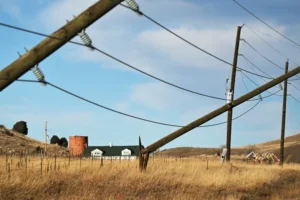Wyoming Department of Transportation Faces $400M Annual Budget Shortfall
Tax increase of one cent per gallon could generate millions, officials tell lawmakers
- Published In: Other News & Features
- Last Updated: Sep 01, 2023

Highway 14 snakes through the Bighorn Mountains outside Shell. (Wyoming Truth photo by Carrie Haderlie)

By Carrie Haderlie
Special to the Wyoming Truth
A one-cent increase in diesel and gasoline taxes in Wyoming could generate around $6.9 million in state revenue.
“The last fuel tax increase was July 1, 2013,” Dennis Byrne, chief financial officer of the Wyoming Department of Transportation (WYDOT), told the Joint Transportation, Highways & Military Affairs committee Thursday morning in Casper. “That was a 10 cent increase on both gasoline and diesel fuel.”
However, since 2014, revenues have been “very flat.”
“If you think about the amount of inflation we’ve experienced since 2014, really, the revenues aren’t keeping up with our ability to” pay for agency expenses, Byrne said.
The state agency, he said, is facing an annual shortfall of about $400 million. Rep. Scott
Smith (R-Lingle) wondered how this shortfall affects Wyoming drivers.
“Out of that shortcoming of finances, where does it impact our citizens the most?” Smith asked.

Certainly it impacts citizens on Wyoming’s roads, Byrne replied, as poorly maintained roads can cause wear and tear on vehicles. WYDOT, he said, is struggling to maintain roads at a 2019 level, which was likely not adequate four years ago.
“You’re seeing more delay times, you’re seeing more potholes, you’re seeing roads that are in worse condition than they have been in the past,” Byrne said.
WYDOT Director Darin Westby added that his agency “struggles with this every day.”
“We cut $70 million out of our … bid lettings earlier this year because we just did not have the funds due to inflation,” Westby said. “Those $70 million worth of projects did not happen.”
Smith said he’s heard complaints from constituents that road maintenance is worse than ever, and that in some places “weeds are taller than even the speed limit signs.” He asked whether WYDOT prioritizes which projects are cut based on safety or by some other measure.
“There is a priority with safety involved, but a lot of what you explained is probably answered by the fact that we are also down 300-plus employees,” Westby said.
Because fuel tax revenues are shared by WYDOT, cities, counties, county road and bridge departments and Wyoming state parks, WYDOT would receive about $4.5 million of that hypothetical one-cent diesel and gasoline tax revenue, according to Byrne.
The Legislative Service Office estimates indicate that a fiscal year 2025 increase of one cent only to the state’s diesel fuel tax could result in an estimated revenue of $3.3 million. A five cent increase could raise $16.7 million, a 10 cent increase could generate $33.4 million and a 15 cent increase could raise $50.2 million.
Westby noted during the meeting that the rate increases under discussion still would not meet the $400 million shortfall.
“Even if you guys were to look at the fuel tax increase by 20 cents, we are still short,” Westby said. “We are constantly looking and talking with our stakeholders about other ideas.”
Wyoming taxes both gasoline and diesel at 24 cents per gallon respectively, which is on the lower end of fuel tax collection rates in the Mountain West. Utah charges 36.4 cents per gallon on gasoline and diesel each, while Idaho charges 30 cents per gallon for both fuel types.
Projected gasoline tax collections for WYDOT’s fiscal year 2024 are anticipated to be $82 million, with 57.5% going to the state’s highway fund. Other revenue is split among cities, county road funds and county budgets. Diesel tax collections for the same time period are expected to net $87 million.
Diesel tax bill ‘laid back’
The committee discussed draft legislation, “Diesel fuel tax amendments,” that would have increased only the diesel tax by an “unspecified amount.” That bill draft also included a rebate program for Wyoming drivers, but after lengthy discussion, the committee decided to “lay back” the bill, meaning it will not be considered at the next meeting. The rebate could have meant an increase in staffing needs at WYDOT and could have impacted the state’s participation in the International Fuel Tax Agreement, according to the Legislative Service Office.

Instead, the lawmakers asked the Legislative Service Office to prepare two similar bill drafts for discussion at the next meeting. The first, requested by Sen. John Kolb (R-Rock Springs), would eliminate a state registration fee of $90 for commercial diesel vehicles, with an analogous reduction to the $30 fee for non-commercial diesel vehicle registration, making up that difference by an as-yet-to-be-determined increase in the state’s diesel fuel tax.
“I have done some preliminary numbers, and it looks to be five cents would yield a $10 million increase for the state’s roads,” Kolb said.
Committee Co-Chairman Brian Boner (R-Douglas) said that Kolb’s draft bill was a “simplification” of the previously considered bill draft that would increase the tax rate and reduce registration fees, saying it would not be a new tax on Wyoming residents.
“It would be net neutral,” he said.
Boner also requested a second bill draft for consideration that would reduce the state registration fee by $20 on all vehicles, with a corresponding increase in both gas and diesel taxes.
“That would even out for Wyoming residents the increase, that by my math, would be one or two cent increase in the gas and diesel tax,” Boner said. “This is not a tax increase on Wyoming residents. This is attempting to capture a user fee from out-of-state vehicles.”
The Transportation, Highways and Military Affairs Committee will meet again Nov. 2-3 in Cheyenne.













